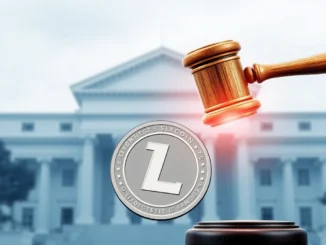
Hold onto your hats, crypto enthusiasts! The Nigerian government has dropped a bombshell on Binance, one of the world’s leading cryptocurrency exchanges. Imagine a penalty so massive it could make even the most seasoned crypto investor sweat. We’re talking a jaw-dropping $81 billion. Yes, you read that right. This isn’t just a slap on the wrist; it’s a full-blown regulatory earthquake. Let’s dive into what’s happening in Nigeria and what this could mean for the future of crypto exchanges operating globally.
Why is Nigeria Demanding an $81 Billion Penalty from Binance?
The heart of the matter lies in allegations of tax violations and illegal foreign exchange trading. Nigerian authorities claim Binance has been operating within their borders without proper registration and has engaged in activities that have led to significant economic losses for the nation. Here’s a breakdown of the charges:
- Unregistered Operations: Nigeria asserts that Binance has been conducting business in the country without the necessary legal permits and registrations. This is a crucial point as it highlights the importance of regulatory compliance for crypto exchanges worldwide.
- Economic Losses: The bulk of the penalty, a staggering $79.5 billion, is attributed to alleged economic losses suffered by Nigeria due to Binance’s operations. The specifics of how this figure was calculated are still emerging, but it suggests serious concerns about the exchange’s impact on the Nigerian economy.
- Tax Fine: In addition to the economic loss penalty, Nigeria is also seeking a $2 billion fine for crypto tax penalty related offenses. This underscores the increasing global scrutiny on crypto exchanges regarding tax compliance.
- Multiple Cases: This isn’t Binance’s first brush with Nigerian law. According to reports, this is the third case against the exchange in Nigeria, adding to existing money laundering and tax evasion charges. This paints a picture of escalating legal pressure on Binance in the region.
Binance, for its part, vehemently denies all allegations. The stage is now set for a high-stakes legal battle, with the trial scheduled to commence this Monday. The outcome could have significant ramifications for Binance and the broader cryptocurrency landscape in Nigeria and beyond.
Understanding the Gravity of Crypto Tax Penalty and Regulation in Nigeria
Nigeria, despite its economic challenges, has emerged as a significant hub for cryptocurrency adoption in Africa. However, this popularity has also attracted regulatory attention. The Nigerian government, like many others globally, is grappling with how to effectively regulate the burgeoning crypto market. This case against Binance needs to be viewed within this context of increasing crypto regulation Nigeria.
Here’s why this situation is particularly significant:
- Setting a Precedent: The outcome of this case could set a major precedent for how other nations regulate and penalize cryptocurrency exchanges. If Nigeria succeeds in imposing such a massive penalty, it might embolden other governments to take a tougher stance.
- Impact on Crypto Adoption: Aggressive regulatory actions can have a chilling effect on crypto adoption. While regulation is necessary for consumer protection and financial stability, overly harsh measures could stifle innovation and push crypto activity underground.
- Global Regulatory Trend: The world is witnessing a global tightening of regulations around cryptocurrencies. From the EU’s MiCA framework to increased scrutiny in the US and Asia, governments are moving towards stricter oversight of the crypto industry. Nigeria’s actions are part of this broader trend.
For crypto investors and enthusiasts, this situation serves as a stark reminder of the evolving regulatory landscape and the importance of understanding the legal frameworks in different jurisdictions.
Binance Nigeria Tax Saga: What Does it Mean for Users?
The unfolding legal drama in Nigeria raises several questions for Binance users, particularly those in Nigeria and other regions with tightening crypto regulations. Let’s consider the potential implications of this Nigeria Binance fine and legal battle:
- Market Volatility: News of this magnitude can trigger market volatility. Users should be prepared for potential price fluctuations in cryptocurrencies, especially those associated with Binance or perceived as higher risk due to regulatory uncertainty.
- Operational Disruptions: While Binance has stated it is cooperating with authorities and denies wrongdoing, the legal proceedings could potentially lead to operational disruptions in Nigeria. Users in Nigeria should stay informed about any announcements from Binance regarding service availability.
- Increased KYC/AML: In response to regulatory pressure, Binance and other exchanges are likely to further strengthen their Know Your Customer (KYC) and Anti-Money Laundering (AML) compliance measures. Users should expect more stringent verification processes and enhanced monitoring of transactions.
- Decentralized Alternatives: Tighter regulations might push some users towards decentralized exchanges (DEXs) and other platforms that operate outside traditional regulatory frameworks. However, it’s crucial to remember that DEXs also come with their own set of risks and challenges.
For Binance users globally, this situation underscores the importance of diversifying their crypto holdings and being aware of the regulatory risks associated with centralized exchanges.
Navigating the Complex World of Binance Tax Evasion Allegations
The accusations against Binance extend beyond simple tax violations, reaching into the realm of Binance tax evasion allegations. While the details are still emerging, the severity of the charges and the massive penalty sought by Nigeria indicate a serious view of Binance’s alleged misconduct.
Key points to consider regarding the tax evasion aspect:
| Aspect | Details |
|---|---|
| Nature of Allegations | Nigeria accuses Binance of facilitating tax evasion through its platform by not properly registering and complying with local tax laws. |
| Financial Impact | The $2 billion tax fine is a direct consequence of these allegations, while the $79.5 billion in economic losses could also be linked to the alleged tax evasion and related illicit activities. |
| Legal Ramifications | If found guilty of tax evasion, Binance could face severe penalties, including hefty fines, restrictions on operations, and even potential criminal charges for executives in certain jurisdictions. |
| Reputational Damage | Even if Binance successfully defends itself against these charges, the allegations themselves can cause significant reputational damage, impacting user trust and market perception. |
The Binance Nigeria tax saga is a complex legal and financial battle with potentially far-reaching consequences. It highlights the increasing pressure on crypto exchanges to operate within the bounds of national and international laws, particularly regarding taxation and financial regulations.
Actionable Insights: What Crypto Users Should Do Now
In light of the Nigeria-Binance situation and the broader trend of tightening crypto regulations, here are some actionable insights for crypto users:
- Stay Informed: Keep abreast of regulatory developments in your jurisdiction and in regions where major crypto exchanges operate. News outlets specializing in cryptocurrency and legal analysis can be valuable resources.
- Diversify Platforms: Don’t rely solely on a single exchange. Diversify your holdings across multiple reputable platforms to mitigate risks associated with regulatory actions or platform-specific issues.
- Understand KYC/AML: Familiarize yourself with the KYC and AML requirements of the exchanges you use. Be prepared to provide necessary documentation and comply with verification processes.
- Explore Decentralized Options (Cautiously): If you are comfortable with the risks and complexities, consider exploring decentralized exchanges and DeFi platforms. However, conduct thorough research and understand the security and smart contract risks involved.
- Seek Professional Advice: For significant crypto investments or complex tax situations, consult with a financial advisor or tax professional who is knowledgeable about cryptocurrencies and relevant regulations.
Conclusion: A Turning Point for Crypto Regulation?
The Nigeria-Binance case is more than just a legal dispute between a nation and a cryptocurrency exchange. It represents a potential turning point in the global landscape of crypto regulation Nigeria and beyond. The sheer magnitude of the penalty sought by Nigeria underscores the seriousness with which some governments are now approaching the regulation of the crypto industry.
Whether this case leads to a landmark victory for regulators or a successful defense by Binance, one thing is clear: the era of unchecked crypto exchange operations is rapidly coming to an end. The future of cryptocurrency will be shaped by how exchanges adapt to evolving regulations and how governments strike a balance between fostering innovation and protecting their financial systems. The world will be watching closely as the Nigeria-Binance drama unfolds.



